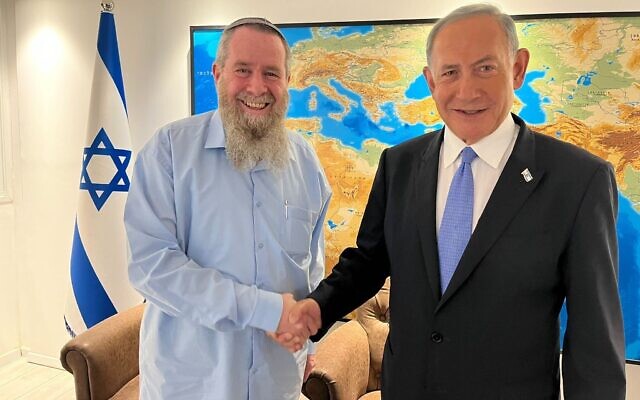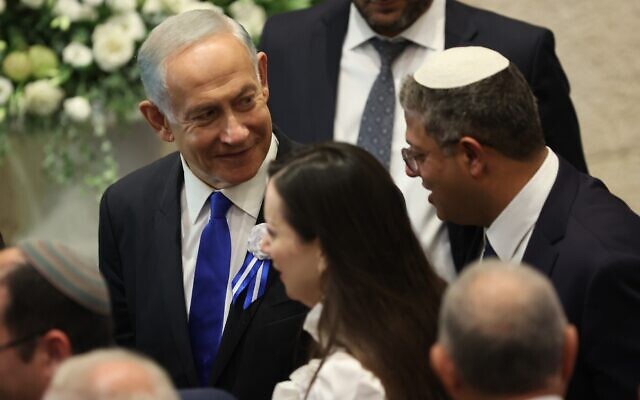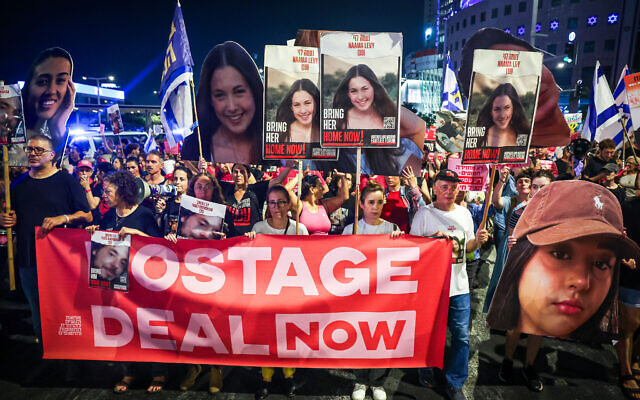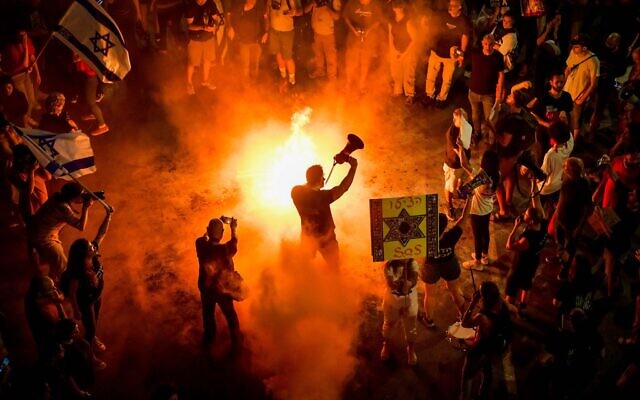Poll: 6 in 10 Israelis fear for democracy as Netanyahu finalizes hardline coalition
Majority of anti-Netanyahu public says Gantz should join his coalition; most right-religious bloc’s voters back Hebron soldier filmed accosting left-wing activists

Roughly six in 10 Israelis are concerned about the future of Israeli democracy, according to a poll released Friday as prime minister-designate Benjamin Netanyahu moved closer to finalizing his next government with a group of far-right and ultra-Orthodox parties.
Sixty-one percent of respondents to a Channel 12 survey said they were worried about the future of Israeli democracy, while 35% said they were not.
The survey found that 41% of respondents who voted for parties in the Netanyahu-led right-wing religious bloc said they were concerned, compared to 82% of respondents who voted for parties in the anti-Netanyahu bloc who said the same.
Respondents were also asked whether the National Unity party led by outgoing-Defense Minister Benny Gantz should enter Netanyahu’s government, ostensibly instead of one or more of the far-right Religious Zionism, Otzma Yehudit and Noam parties. Thirty-nine percent of respondents said yes, while 46% said no. Among the anti-Netanyahu bloc voters, 63% said that Gantz should agree to enter the Likud-led coalition.
Gantz rejected the idea during a Friday interview on Channel 12, saying he doesn’t “believe a word that comes out of Netanyahu’s mouth.”
The two formed a unity coalition in 2020 that lasted less than a year after Netanyahu moved to block Gantz from replacing him as premier as part of a rotation agreement. Gantz also accused Netanyahu on Friday of allowing the “dismantlement of the IDF” through the various coalition deals he’s signed in recent weeks that would apparently give new powers to far-right ministers over some security force units operating in the West Bank.
Gantz also warned that Netanyahu would tear the state apart if he doesn’t manage to rein in the extremist parties he’s bringing into his coalition.
Netanyahu has signed coalition deals with the far-right Otzma Yehudit, Religious Zionism and Noam parties and is slated to finalize agreements with the ultra-Orthodox Shas and United Torah Judaism parties in the coming days.

In the deal with Otzma Yehudit, Netanyahu agreed to appoint party chairman Itamar Ben Gvir as national security minister with authority over Israel Police and the Border Police’s division in the West Bank. He also agreed to advance the legalization of dozens of illegal Israeli outposts throughout the West Bank.
Ben Gvir has pledged to seek to deport “disloyal” Arabs, impose the death penalty for those convicted of terror acts and ease security forces’ open-fire rules against Palestinian suspects.
In the deal with Religious Zionism, Netanyahu agreed to name party chairman Bezalel Smotrich finance minister in addition to transferring control over a pair of Defense Ministry bodies responsible for authorizing settlement construction, Palestinian home demolitions and broader control of Palestinian civilian life to a member of the far-right right party, possibly Smotrich himself, who will serve as a junior minister in the Defense Ministry.
Smotrich has pushed for the dismantlement of the Palestinian Authority and supports annexing large parts of the West Bank without granting equal rights to Palestinians in those areas. He also campaigned on passing legislation that would cancel the fraud and breach of trust charge that Netanyahu faces in his criminal trial, and said he ultimately backs implementing a state governed by Orthodox religious law.
In Likud’s deal with the homophobic Noam party, Avi Maoz’s one MK faction, Netanyahu agreed to appoint Maoz deputy minister in the Prime Minister’s Office tasked with running a new “national Jewish identity” government agency, which will come with a budget of at least NIS 100 million ($29 million), as well as over a dozen staffers.
The Education Ministry unit responsible for external teaching and partnerships will be placed under Maoz’s control, giving him authority over non-official bodies enlisted to teach or lecture at schools. Maoz has said he will work to end both female service in the IDF along with the annual Jerusalem pride parade.
Lawmakers from all parties in the likely coalition have also pledged to pass legislation that would allow the Knesset to re-legislate laws struck down by the High Court as undemocratic. The Netanyahu-led majority Knesset bloc could seek to pass this so-called “override clause” in the coming days, as current law bars convicted lawmakers given jail terms from becoming ministers and Netanyahu plans to appoint twice-convicted Shas chairman Aryeh Deri, who was handed a suspended sentence for tax offenses earlier this year, as interior minister. The High Court might reject such an appointment, and an “override clause” could thwart such a move by the justices and radically limit their powers overall.
In its polling Friday, Channel 12 also asked respondents about the punishment handed down to a soldier in Hebron who was filmed boasting to left-wing activists about how Ben Gvir will restore order in the flashpoint city. The soldier was initially jailed for 10 days, but that term was reduced to six days on Friday, amid a far-right backlash and after he apologized.

Thirty-two percent of respondents said Ben Gvir was right in backing the soldier in the viral video, compared to 42% who agreed with IDF Chief of Staff Aviv Kohavi, who said that the soldier had acted inappropriately and deserved to be punished. Among pro-Netanyahu voters, 58% agreed with Ben Gvir compared to just 14% who backed Kohavi.
Asked whether they feared for the future of the IDF as the people’s army, 44% of respondents said they did while 44% said they did not.
Channel 12 did not immediately state how many people participated in the poll or what its margin of error was.
Also Friday, former Likud MK and minister Tzachi Hanegbi told Channel 12 that Netanyahu will never consent to a two-state solution to the Palestinian conflict, after publicly endorsing it in principle in 2009.
“There’ll never be two states. It will never happen. Netanyahu won’t allow it. The people don’t want it,” said Hanegbi, a close confidant of the prime minister-designate.
In a Channel 12 interview on Thursday, the US Ambassador to Israel Tom Nides stressed the US’s ongoing commitment to the two-state solution. “We want to preserve a two-state solution,” Nides said.










